Zirconium Crowns and Veneers in Turkey
Zirconium crowns and veneers are quite popular in Turkey, as they are in many other countries. Zirconium is a strong and durable material that is used in dental restorations, and it has become a popular choice for crowns and veneers because of its aesthetic properties.
What are zirconium crowns and veneers?
Zirconium crowns and veneers are dental restorations made from zirconium oxide, a high-strength ceramic material that is biocompatible with the human body. Zirconium crowns and veneers are used to improve the appearance and function of damaged or discolored teeth.
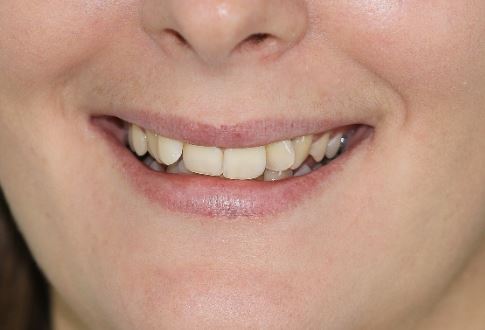
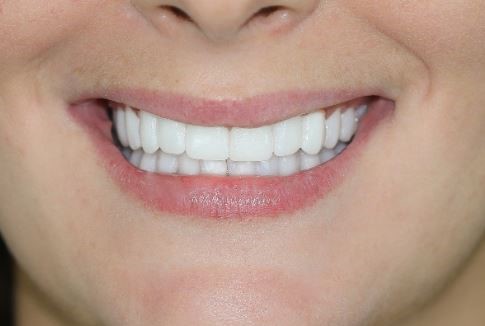
Here is a brief description of zirconium crowns and veneers:
Zirconium crowns before and after: the result happy smile
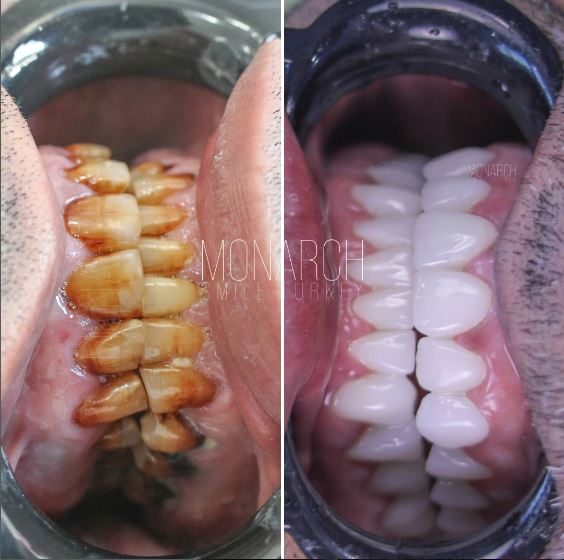
A zirconium crown is a cap-like restoration that covers the entire tooth to protect it from further damage or decay. Zirconium crowns are highly durable and can withstand the pressure and force of chewing and biting. They are also highly aesthetic, as they can be customized to match the color and shape of the surrounding teeth. Zirconium crowns are often preferred over traditional metal-based crowns because they are less likely to cause allergic reactions and are more aesthetically pleasing.

A zirconium veneer is a thin shell that is placed over the front surface of a tooth to improve its appearance. Zirconium veneers are highly translucent and can be customized to match the color and shape of the surrounding teeth. They are often used to cover teeth that are stained, chipped, or slightly misaligned. Zirconium veneers are less invasive than traditional veneers made of porcelain, as they require less removal of the tooth structure.
Both zirconium crowns and veneers offer several advantages over traditional dental restorations. They are highly durable, biocompatible, and aesthetically pleasing, and can help improve the appearance and function of damaged or discolored teeth. However, it's important to note that not everyone is a good candidate for zirconium crowns or veneers, and your dentist will need to evaluate your oral health and make a recommendation based on your individual needs.
Who is eligible for zirconium teeth?
Zirconium crowns and veneers are suitable for a wide range of patients, but not everyone is a good candidate for these restorations. Here are some factors that make a patient a good candidate for zirconium crowns and veneers:
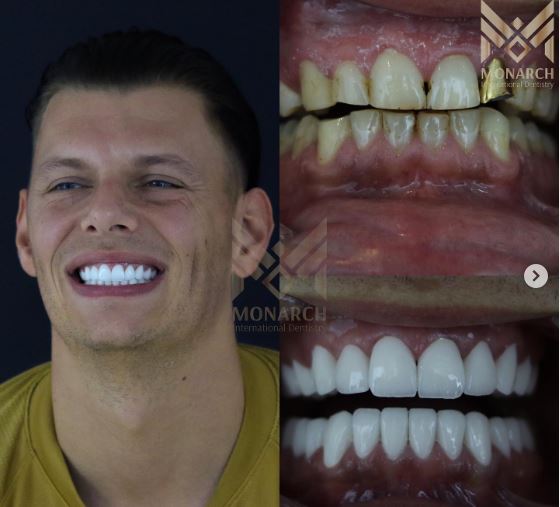
- Good oral health
Patients should have good overall oral health and no active decay or gum disease before undergoing zirconium crown or veneer treatment.
- Sufficient tooth structure
Patients should have enough tooth structure remaining to support the zirconium crown or veneer. In some cases, if there is not enough tooth structure, other dental treatments may be necessary before a zirconium crown or veneer can be placed.
- Good bite alignment
Patients with good bite alignment are good candidates for zirconium crowns and veneers, as they can help protect the natural teeth and maintain proper alignment.
- Cosmetic concerns
Patients who have cosmetic concerns about their teeth, such as discolored, stained, or misshapen teeth, may benefit from zirconium crowns and veneers.
- Desire for long-lasting restorations
Patients who want restorations that are durable, long-lasting, and aesthetically pleasing may be good candidates for zirconium crowns and veneers.
It's important to note that not everyone is a good candidate for zirconium crowns and veneers, and a thorough evaluation by a qualified dental professional is necessary to determine if these restorations are appropriate for your individual needs.
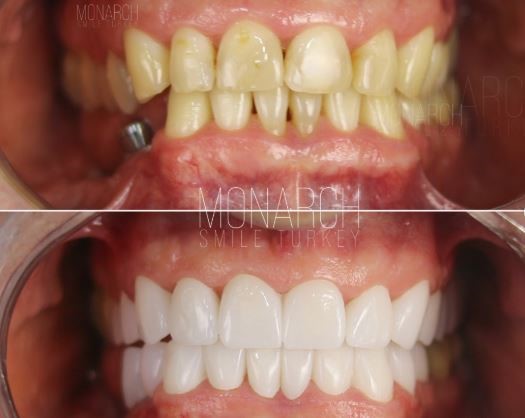
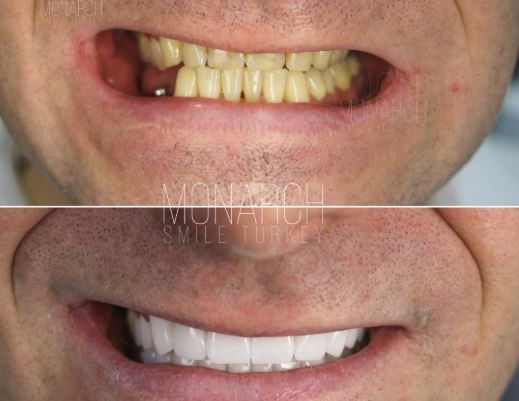
What are the advantages and disadvantages of zirconium crown and veneer?
Zirconium crowns and veneers are two common dental restorations that are used to restore damaged teeth's functionality and look. A few benefits and drawbacks for each are listed below:
Pros of Zirconium Crowns:
Zirconium crowns are highly durable and long-lasting, biocompatible, highly esthetic, resistant to wear and tear.
Cons of Zirconium Crowns:
Zirconium crowns can be more costly than conventional dental restorations, necessitate greater tooth structure removal during installation, and demand a higher level of skill and precision.
Pros of Zirconium Veneers:
Zirconium veneers are highly esthetic, they can be used to correct a variety of cosmetic issues, including discoloration, chipping, and misalignment, durable and long-lasting, natural-looking smile
Cons of Zirconium Veneers:
Zirconium Veneers are more expensive than other types of veneers, require a certain level of expertise and precision to install.
Please click here to get more info!
What will I ask to dentist for zirconium teeth at consultation?
If you're considering zirconium teeth, here are some questions you may want to ask your dentist during your consultation:
- Am I a good candidate for zirconium teeth?
- What are the benefits and drawbacks of zirconium teeth compared to other types of dental restorations?
- How long do zirconium teeth typically last?
- Will my zirconium teeth look natural and blend in with my other teeth?
- How long will the process of getting zirconium teeth take, and what can I expect during the procedure?
- Are there any risks or complications associated with getting zirconium teeth?
- How much will zirconium teeth cost, and will my insurance cover any of the expenses?
- How do I care for and maintain my zirconium teeth, and are there any special precautions I need to take?
- Can you provide me with before-and-after photos of other patients who have had zirconium teeth?
- What is your experience with placing zirconium teeth, and how many of these procedures have you performed?
These questions will help you gain a better understanding of the procedure, and help you make an informed decision about whether zirconium teeth are the right choice for you.
What tests are done before a zirconium crown and veneer?
Before a zirconium crown or veneer is placed, your dentist will perform a comprehensive dental examination to determine if the treatment is appropriate for you. Here are some of the tests and assessments that may be performed:
- X-rays
Your dentist may take X-rays of your teeth and jaws to assess the extent of any damage, decay or infection that may require treatment before a crown or veneer can be placed.
- Dental impressions
Dental impressions of your teeth will be taken to create a model of your mouth that will be used to fabricate your crown or veneer.
- Bite evaluation
Your dentist will evaluate your bite to ensure that the crown or veneer is placed in the correct position to avoid any problems with your bite.
- Tooth preparation
Before the crown or veneer can be placed, your dentist will prepare the tooth or teeth by removing any decay or damage and shaping the tooth to ensure proper fit.
- Shade selection
Your dentist will work with you to select the appropriate shade of zirconium material that will blend in with your natural teeth for a seamless and natural-looking result.
- Occlusion evaluation
Your dentist will evaluate your bite to ensure that the crown or veneer is placed in the correct position to avoid any problems with your bite.
- Oral health assessment
Your dentist will evaluate your oral health and ensure that your gums and surrounding teeth are healthy and free from any underlying issues that could affect the success of the procedure.
By performing these tests and assessments, your dentist can ensure that the crown or veneer is placed properly and that it will function and look natural. It's important to discuss any concerns or questions you may have with your dentist before undergoing the procedure.
What should I do before zirconium crown and veneer?
Before getting zirconium teeth, it's important to take some steps to prepare for the procedure. Here are some things you can do before getting zirconium teeth:
Schedule a consultation with your dentist to discuss your options and determine if zirconium teeth are the best option for you.
Schedule a dental cleaning to ensure that your teeth and gums are healthy and free of any underlying issues that could affect the success of the procedure.
Inform your dentist of any medical conditions or medications you are taking that may affect the procedure or your recovery.
Since you may be given a sedative during the procedure, arrange for transportation to and from your appointment.
Depending on the extent of the procedure, you may need to take time off from work or other activities to recover.
Your dentist may give you specific instructions to follow before the procedure, such as fasting or avoiding certain foods or medications.
Maintaining good oral hygiene before and after the procedure can help prevent complications and ensure the long-term success of your zirconium teeth.
By taking these steps before getting zirconium teeth, you can help ensure that the procedure goes smoothly and that you have a speedy recovery
How is performed zirconium crown and veneer procedure?
Here is a detailed procedure for getting zirconium crown and veneer:
Zirconium Crown Procedure:
- Dental examination
Your dentist will first conduct a comprehensive dental examination to assess the extent of damage to the tooth and determine if a zirconium crown is the best option for you.
- Tooth preparation
The dentist will prepare the tooth by removing any decay or damage and shaping the tooth to make room for the crown. This may involve removing some of the tooth structure to make sure that the crown fits properly.
- Dental impression
Once the tooth is prepared, the dentist will take an impression of your mouth to create a model of the tooth. This model will be used to create the zirconium crown.
- Temporary crown
While the permanent crown is being made, your dentist will place a temporary crown to protect the tooth.
- Zirconium crown placement
Once the permanent zirconium crown is ready, your dentist will remove the temporary crown and place the permanent crown on the prepared tooth using dental cement.
- Bite evaluation
Your dentist will evaluate your bite to ensure that the crown is placed in the correct position to avoid any problems with your bite.
Zirconium Veneer Procedure:
- Dental examination
Your dentist will first conduct a comprehensive dental examination to assess the extent of damage to the tooth and determine if a zirconium veneer is the best option for you.
- Tooth preparation
The dentist will prepare the tooth by removing a thin layer of the enamel to make room for the veneer. This may involve removing some of the tooth structure to make sure that the veneer fits properly.
- Dental impression
Once the tooth is prepared, the dentist will take an impression of your mouth to create a model of the tooth. This model will be used to create the zirconium veneer.
- Temporary veneer
While the permanent veneer is being made, your dentist will place a temporary veneer to protect the tooth.
- Zirconium veneer placement
Once the permanent zirconium veneer is ready, your dentist will remove the temporary veneer and place the permanent veneer on the prepared tooth using dental cement.
- Bite evaluation
Your dentist will evaluate your bite to ensure that the veneer is placed in the correct position to avoid any problems with your bite.
Finally, the procedure for getting a zirconium crown or veneer is similar to that of other dental restorations. It's important to follow your dentist's instructions carefully and maintain good oral hygiene to ensure the long-term success of the restoration.
How is recovery after zirconium teeth procedure?
Recovery after getting a zirconium crown or veneer is typically quick and easy. Here are some things to expect during the recovery period:
- Brush and floss
- Discomfort
- Avoid certain foods
- Sensitivity
- Follow-up appointments
It's important to maintain good oral hygiene by brushing and flossing regularly after the procedure. Your dentist may also recommend a special mouthwash to help prevent infection.
You may experience some mild discomfort or soreness in the treated area for a few days after the procedure. This can typically be managed with over-the-counter pain medication.
Avoid hard, sticky, or chewy foods for the first few days after the procedure to allow the cement to fully set and the tooth or teeth to adjust to the new restoration.
You may experience some sensitivity to hot or cold temperatures or pressure immediately after the procedure. This should subside within a few days as your tooth and gums adjust to the new restoration.
You may need to schedule a follow-up appointment with your dentist to ensure that the crown or veneer is properly seated and functioning as expected.
Finally, recovery after getting a zirconium crown or veneer is usually quick and easy, and most people are able to resume their normal activities immediately after the procedure. However, it's important to follow your dentist's instructions carefully and contact them if you experience any persistent discomfort or issues.
FREQUENTLY ASKED QUESTIONS
How much do zirconium crowns and veneers in Turkey?
The number of teeth being treated as well as the case's complexity. However, compared to many other nations, the price of zirconium crowns and veneers in Turkey is typically less expensive.
Zirconium crowns typically cost between $60 to $180 USD. In Turkey, a zirconium veneer can cost between $120 to $240 USD.
It's vital to keep in mind that these costs are only estimates and could change depending on the aforementioned factors. To have a precise sense of the cost, it is usually advised to request a customized quote from a dental clinic in Turkey. When selecting a clinic, it's also crucial to take the caliber of the dental treatment and the dentist's credentials into account.
Why is Turkey popular for zirconium crown and veneer procedure?

One of the main reasons why patients choose Turkey for zirconium teeth procedures is the cost. Dental care in Turkey is generally less expensive than many other countries, including those in Europe and North America. As a result, patients can often save a significant amount of money by traveling to Turkey for their dental care.
Despite the lower costs, dental care in Turkey is generally of a high quality. Many dental clinics in Turkey use the latest technology and equipment, and the dentists are often highly trained and experienced.
Turkey is a popular tourist destination, and many dental clinics are located in or near popular tourist areas, making it easy for patients to combine their dental treatment with a vacation.
Many dentists and dental clinics in Turkey have staff members who speak English, making it easy for patients to communicate their needs and concerns.
Many patients choose Turkey for zirconium teeth procedures because of the combination of high-quality care, affordable prices, and convenience. However, it's important for patients to do their research and choose a reputable and qualified dental clinic to ensure the best possible outcome.
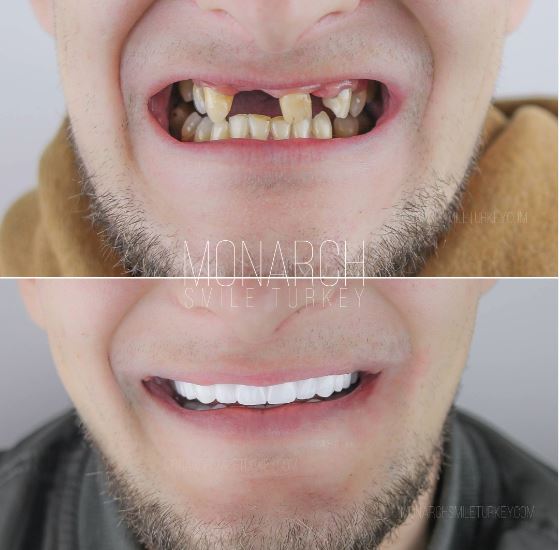
Does zirconium veneer and crown procedure hurt?
The zirconium teeth procedure is typically not painful, as local anesthesia is used to numb the area being treated. However, it's not uncommon for patients to experience some discomfort or sensitivity after the procedure. Here are some things to expect:
Your dentist will use a local anesthetic to numb the area being treated, which means you should not feel any pain or discomfort during the procedure.
After the procedure, you may experience some mild discomfort or soreness in the treated area. This can typically be managed with over-the-counter pain medication.
You may experience some sensitivity to hot or cold temperatures or pressure immediately after the procedure. This should subside within a few days as your tooth and gums adjust to the new restoration.
Your dentist may need to make some minor adjustments to the bite of the restoration, which can cause some discomfort or soreness.
You may need to schedule a follow-up appointment with your dentist to ensure that the crown or veneer is properly seated and functioning as expected.
The zirconium teeth procedure is generally not painful, and any discomfort or sensitivity can typically be managed with over-the-counter pain medication. However, if you experience any persistent or severe pain, it's important to contact your dentist right away.
How long does zirconium veneer and crown last?
Zirconium teeth procedures, such as zirconium crowns and veneers, are considered permanent restorations. Once the zirconium restoration is placed, it is designed to last for a long time, typically for at least 10-15 years or longer with proper care and maintenance. However, like all dental restorations, zirconium teeth may need to be replaced at some point due to wear and tear or damage.
The longevity of the restoration depends on various factors, such as the quality of the materials used, the placement of the restoration, the skill and experience of the dentist, and the level of care and maintenance provided by the patient. Proper oral hygiene, regular dental check-ups, and avoiding hard or sticky foods can help prolong the life of the restoration.
It's important to note that getting a zirconium restoration is a permanent decision, as the tooth structure will be altered to accommodate the restoration. If a zirconium restoration needs to be replaced or removed, additional dental work may be needed to repair or replace the tooth structure. Therefore, it's important to carefully consider all options and discuss any concerns or questions with your dentist before undergoing the procedure.
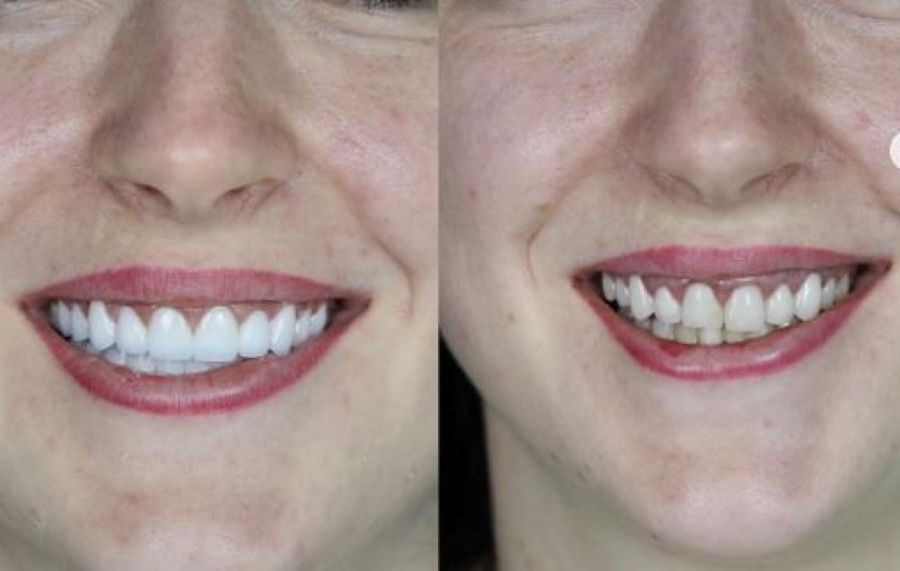
Is zirconium teeth procedure worth it?
Zirconia crowns are worth it because: zirconium is a robust and resilient material that can tolerate deterioration over time, the repair may last for many years, zirconium teeth are made to look natural and mix in with the surrounding teeth, the smile's appearance may be enhanced, zirconium is biocompatible, it is unlikely to result in an allergic reaction or other negative side effects.
Please click here to get more info!
What are alternatives to zirconium veneer and crown?
Depending on the unique dental requirements and preferences of the patient, zirconium veneers and crowns have a number of possibilities. Here are several options: Porcelain Veneers and Crowns, Composite Veneers and Crowns, Gold Crowns, Metal Crowns, Emax Crowns, Orthodontic Treatment.
Please click here to get more info!
Are zirconium teeth guaranteed?
Zirconium veneers and crowns are typically guaranteed by the dental laboratory or manufacturer for a certain period of time, usually ranging from 1 to 5 years. However, the length of the guarantee can vary depending on the laboratory or manufacturer, and it's important to check with your dentist to determine the specific terms of the guarantee.
It's important to note that the guarantee typically only covers manufacturing defects or failures, and it may not cover issues that arise due to improper care or maintenance of the restoration. Therefore, it's important to follow your dentist's instructions carefully and maintain good oral hygiene to ensure the long-term success of the restoration.
Additionally, some dental clinics or dentists may offer a separate guarantee or warranty for the restoration, which may provide additional coverage or protection. It's important to discuss any concerns or questions with your dentist before undergoing the procedure to ensure that you understand the terms of the guarantee or warranty.
Are there do's and don'ts for zirconium teeth?
Here are some do's and don'ts for zirconium veneers and crowns:
Do's:
Don'ts:
Why do my teeth hurt after zirconium teeth procedure?
It's not uncommon to experience some sensitivity or discomfort after a zirconium teeth procedure, such as the placement of a zirconium crown or veneer. Here are some possible reasons why your teeth may be hurting after the procedure:
- It's common to experience some sensitivity to hot or cold temperatures or pressure immediately after the procedure. This is usually temporary and should subside within a few days as your tooth and gums adjust to the new restoration.
- Your dentist may have needed to make some minor adjustments to the bite of the restoration, which can cause some discomfort or soreness.
- In rare cases, the placement of a zirconium restoration may irritate the nerve of the tooth, which can cause pain or discomfort.
- If there were pre-existing dental issues, such as decay or infection, that were not fully addressed before the placement of the zirconium restoration, this could lead to pain or discomfort.
- If the gums around the restoration become inflamed, this can cause pain or discomfort.
- If your teeth are hurting after a zirconium teeth procedure, it's important to contact your dentist as soon as possible to determine the cause of the issue and receive appropriate treatment. Depending on the cause of the pain or discomfort, your dentist may recommend medication, a bite adjustment, or further dental treatment.
Do smokers can have zirconium veneer and crown?
While smokers can have zirconium veneers and crowns, it's important to note that smoking can have negative effects on the restoration and the surrounding teeth and gums. Here are some potential issues to consider:
- Smoking can cause staining and discoloration of the zirconium restoration over time, which can detract from the appearance of the smile.
- Smoking can weaken the tooth structure and gums, which can reduce the durability and longevity of the zirconium veneers or crowns.
- Smoking is a major risk factor for gum disease, which can cause inflammation and damage to the gums and surrounding tooth structure. This can impact the success of the zirconium restoration and may require additional dental treatment.
- Smoking can impair the body's ability to heal after dental procedures, which can increase the risk of complications and prolong the recovery process.
- If you are a smoker, it's important to discuss the potential risks and benefits of zirconium veneers and crowns with your dentist before undergoing the procedure. Your dentist may recommend quitting smoking or taking additional precautions to minimize the risks associated with smoking and dental restorations.
Additionally, quitting smoking can improve your overall oral health and reduce the risk of complications and long-term issues with the restoration.
Are there myths about zirconium veneers and crowns?
There are several myths and misconceptions about zirconium teeth procedure. Here are some of the most common ones:
While zirconium restorations have many benefits, they are not always the best option for every patient. The choice of restoration depends on the individual's dental needs, preferences, and budget.
While zirconium restorations can be more expensive than some other types of restorations, the cost can vary depending on the individual case and the dental provider.
While zirconium restorations are designed to last for many years with proper care and maintenance, they may need to be replaced at some point due to wear and tear or damage.
While zirconium restorations are designed to look natural and blend in with the rest of the teeth, the final result can depend on the skill and experience of the dentist and the quality of the materials used.
While some types of restorations can be placed in one appointment, zirconium restorations typically require multiple appointments and may take several weeks to complete.
It's important to discuss any concerns or questions with your dentist before undergoing the zirconium teeth procedure to ensure that you have accurate information and understand the potential benefits and drawbacks.
What are side effects of zirconium veneer and crown procedure?
While the zirconium veneer and crown procedure is generally safe and well-tolerated, there are some potential side effects and complications to be aware of. Here are some possible side effects:
Patients may experience some sensitivity to hot or cold temperatures or pressure immediately after the procedure. This is usually temporary and should subside within a few days.
Patients may experience some discomfort or soreness in the gums or tooth after the procedure, which should subside within a few days.
There is a risk of infection after the procedure, which can be minimized by following your dentist's post-operative instructions carefully and maintaining good oral hygiene.
The process of preparing the tooth for the restoration may cause damage to the surrounding teeth, which can lead to sensitivity or other issues.
In rare cases, the restoration may cause issues with the bite or cause discomfort when biting or chewing.
While rare, some patients may experience an allergic reaction to the zirconium material or other components used in the restoration.
It's important to discuss any concerns or questions with your dentist before undergoing the procedure to ensure that you understand the potential risks and benefits. Your dentist can provide guidance on how to minimize the risk of complications and ensure a successful outcome.
Will zirconia crowns change color? or Do zirconia crowns discolour?
Due to substances with coloring properties, color changes occur in our natural teeth, and the colour of the tooth turns yellow or darker. The roughness of the outer surface of the teeth facilitates the discolouration of the teeth. The outer surface of the zirconium crown is not as rough as natural teeth. For this reason, zirconium crowns are less affected by objects such as tea and coffee, which have high colouring properties. Due to the physical structure of the crown, the accumulation of food residues on the outer surface is less compared to natural teeth. Since the accumulation will be less, the colour change on the tooth surface is not felt much. If routine dental cleaning is not done, the layer formed due to food residues on the outer surface of the zirconium crown is cleaned more easily.
Does zirconium crown cover health insurance?
It's best to contact your insurance company to find out what is covered by insurance and what is not. Some health insurance companies may cover some or all of the costs in cases that are directly related to the patient's health. In the absence of such a serious requirement, the procedure is excluded from insurance coverage, as the zirconium crown is considered a cosmetic procedure.
Does zirconium crown cover health insurance?
The zirconium crown leaves the mouth tasting and smelling the same because it is made of non-metal. If some metallic crowns are used, there may be odour in the mouth and purplish discolouration at the junction of the tooth and gingiva. This may suggest that zirconium also causes odor. It is natural for odours to form in the mouth as a result of food residues remaining in the mouth. Because food stinks. Failure to care for teeth and gums causes the odour to persist. Odour may also be felt in the mouth during diseases such as tonsil infection and fungal disease in the mouth. Some people may think that the smell is due to the zirconium crown. However, it should be known that the zirconium crown is not the cause of the odor.
Is zirconium crown and veneer compatible with tooth tissue?
Zirconium crowns are not treated like foreign matter by the body. For this reason, it is the choice of many dentists. As we mentioned before, it does not contain metal in its structure. For this reason, the taste and odor changes that are sometimes seen in the mouths of those who wear metal-mixed crowns are not encountered. Since it does not contain metal, patients do not experience metal allergy or immunological reaction. In other words, those with metal allergies may prefer zirconium crowns. Bleeding, infection and gingival recession due to zirconium do not occur in people who have had zirconium crowns (unless the patient has any other disease).
Do zirconia crowns break easily? or Can zirconia crowns fall off?
Very strong medical adhesives are used during the zirconum crown or veneer treatment. If there are no blows that cause serious damage, there will be no fall or breakage. In other words, it may be possible to use the zirconium crown or veneer for years without falling or breaking by following the recommendations of the dentist after the treatment. Teeth grinding and clenching seen in some people, breaking hard-shelled objects with their teeth or eating, consuming sticky or creeping foods, combat sports, or very hard blows due to impacts can damage the crown or veneer.
What are the complications of zirconium crown and veneer treatment?
Zirconium crown treatment is generally a risk-free operation. Complications do not occur after this treatment, except for some minor symptoms. The following results are likely to be seen after zirconium crown treatment. These can be completely avoided or reduced with the measures to be taken.
- Bleeding (hematoma) and bruising
- Swelling
- Infection
- Pain
- Poor wound healing
- Incorrect placement of the crown and resulting fall
Is zirconium good for crowns?
Zirconia crown is one of the best choices for the teeth at the back of your mouth. In addition, zirconia is very convenient in terms of treatment time and does not take too much time.
What are the zirconia crowns methods in Turkey?
There are several methods used to create and place zirconia crowns in Turkey. The most common methods are:
- Traditional method: This method involves taking an impression of the tooth and sending it to a dental lab where the crown is fabricated. The crown is then placed on the tooth during a separate appointment.
- CAD/CAM method: This method uses computer-aided design and computer-aided manufacturing to create the crown. An impression is taken of the tooth and then scanned into a computer. The crown is designed and fabricated in the office using a milling machine. The crown is then placed on the tooth during the same appointment.
- One-visit method: This method involves taking an impression of the tooth and a digital scan, then fabricating the crown using a CEREC machine in the same appointment. The crown is then placed on the tooth during the same appointment.
All the methods mentioned above are widely used in Turkey, and the choice will depend on the preference of the dentist and the clinic, as well as the specific needs of the patient.
Why are zirconia crowns so cheap in Turkey?
Zirconia crowns are relatively inexpensive in Turkey compared to many other countries for several reasons:
- Lower labor costs: The cost of labor in Turkey is generally lower than in many other countries, which can help keep the cost of dental treatments down.
- High demand: Turkey is a popular destination for dental tourism, which can drive down the cost of treatments as dentists are able to see a high volume of patients.
- Government support: The Turkish government supports dental tourism by providing the necessary infrastructure and resources to attract more international patients.
- Strong economy: The growth of the dental tourism sector is supported by Turkey's robust economy. This allows dentists to invest in the latest technology and equipment to provide high-quality treatments at an affordable cost.
- Currency Exchange: The currency exchange rate between the Turkish Lira and other currencies may also play a role in making dental treatments more affordable for international patients.
Note:
You can contact us to get detailed information about zirconium veneer and crown procedure and to be examined.
This article is for informational and advisory purposes. The recommendations of your dentist who will examine you and perform procedure should be a priority.
